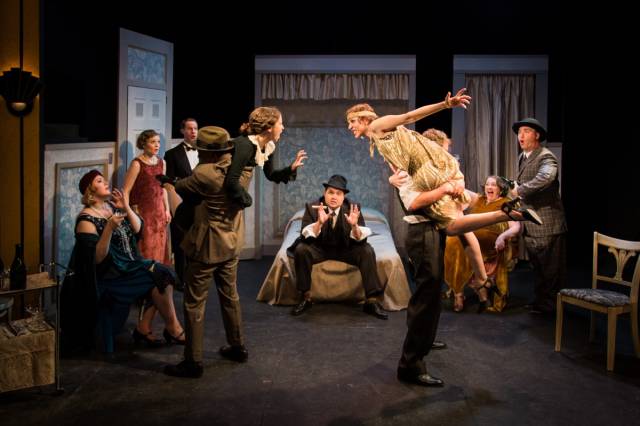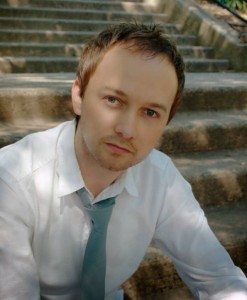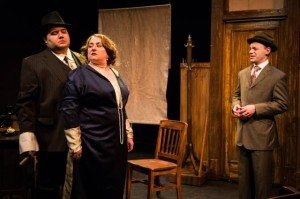

This month, Retro Productions, a theatre company that presents “retro theatre” pieces with a historical perspective, is celebrating its tenth anniversary with a revival of George S. Kaufman’s showbiz comedy The Butter and Egg Man. Originally produced in 1925, the play focuses on Peter Jones, a young man from Ohio who finds himself navigating the ever-dramatic world of Broadway when he decides the best place to invest his money is in a Broadway show.
Helming this new production is director Ricardo Rust, an artist whose background includes roles as a director, choreographer, actor, and dancer. Originally from Pretoria, South Africa, Rust’s previous work includes choreography for The Bleeker Company, the musical Somewhere With You, which debuted at the 2014 New York Musical Theatre Festival, and The Willows Theatre Company, where he worked on such productions as the regional premiere of Avenue Q and the West Coast premiere of Evil Dead: The Musical. We sat down with Rust to talk about his directorial vision for The Butter and Egg Man, the influence of his South African upbringing, and his multi-faceted career.
What first attracted you to directing The Butter and Egg Man?
Heather Cunningham [Artistic Director of Retro Productions] sent me the script and said ‘here’s a play I would like to do’ — it was an era that they hadn’t done. I’m obsessed with Kaufman, and the Marx Brothers, but I don’t necessarily gravitate towards plays. The idea that there’s so much musical, physical comedy in this play is kind of what triggered it for me. I made the final decision to do it because I fell in love with the character who I knew wasn’t the main focus of the play. The main characters gelled so much with me that the “Butter and Egg Man” that comes in at the end of the play, Oscar Fritchie, was the one that stood out and really just popped. If that happens on a first read for me it’s a sure fire sign for me that I’m going to gel with the script.
 So since you mentioned that the musical comedy in the show drew you to it, and as someone with a musical theatre background, did that factor into how you approached the show?
So since you mentioned that the musical comedy in the show drew you to it, and as someone with a musical theatre background, did that factor into how you approached the show?
Not necessarily. I started with finding the heart in all the characters, and Kaufman makes it pretty easy, but he also doesn’t throw it in your face in the script. So for me, whether it’s a dance piece, or it’s a play, or a full-on musical, the thing that needs to shine through is the storytelling and the character arc. So I definitely approach it from the character’s point of view. In terms of rehearsal, it all became about how these people move and how they function in their own bodies, which then led to — yes, some of the transitions had dance in there, but it was more about what would come naturally for them. One thing we did talk about at the first rehearsal were these massive set changes that we had to deal with, which, in my mind, had to be almost like a Gatsby lawn party, where people just didn’t care if they looked a fool. They were having fun, they were having champagne, and things just happened. So that’s how I wanted to approach the entire show, because it is that time period, and it just kind of sparked everything else.
In looking at the play from the characters' point of view, was there anything in particular you were trying to bring out or emphasize in this production?
Yes: the reason why we should fall in love with each of these characters. I wanted to see full characters, and the audience needed to connect with them. So I needed to know what happened in their lives that placed them here in front of us, in this very specific moment. I wanted to see how the relationships popped — you know, you have that brotherhood between Oscar and Peter that’s just lovely to watch, like two little kids in the sandbox. Then you do have the love interests, and you have the more mature couple, the Lehmans, who just have this love-hate relationship, where it’s beautiful to see people who have been together for so long and can laugh and joke with each other and fighting is never going to break them up, that’s not even a thought. Those are the moments that I would say are at the heart of the play that I wanted to pull out. I wanted people to see real people.
This production is for Retro Productions, whose mission is to tell stories with a historical perspective, and the play is very much a product of its time. How did you approach the play in terms of depicting it as a product of the 1920’s, and how much of it was about trying to make the piece universal and appeal to modern audiences?
I honestly feel that, after I read the script, yes it is a classic and yes it is a retro piece in that sense, but so much of what these people go through are things we go through today. We don’t hint at costumes, we actually commit to the period, and I think throughout the entire show set-wise we’ve really tried to be as accurate as possible for the time period. But I think the language itself is what makes or breaks it in terms of crossing over into today’s times. So we're hinting at accents instead of blowing people out of the water, and slowing down certain parts where the terminology might not be recognizable, or giving a hint of body language that would translate the phrase if it’s something that’s different. I think the script itself transcends regardless. That’s actually a good question.
I just feel like we really focused on making it sure that it was in the twenties. There’s so much about being stuck in between two wars, not knowing what’s coming. And Prohibition’s in the middle of that — something that we don’t really understand, and it’s hinted at plenty of times in the script without knocking people over the head with it. The people who understand the time period realize the reactions that are happening and there are little nuances here and there that are in the show, and if you’re familiar with the time period those things pop out. But it’s so much more for me about these people’s journey that it’s more important for me to focus on that, and getting that transcendent, than giving a hint of the time period.
Getting into your background a bit, most of your creative work has been as a choreographer. When you go into a production as a director, how does your choreography background affect you?
I do have a dance background. I did not start out as a dancer, I started out as a vocalist, and I have a degree in musical theatre performance. I danced professionally for a while, but honestly what made the transition for me from being a choreographer to being a director, was the first show I directed, Forever Plaid. And that’s a show I’m obsessed with, it’s the first show I saw when we moved to the States, and it’s just something that gelled, it’s just fun. When the piece was presented to me I had submitted to be a choreographer for the show. And the Artistic Director came up to me and said ‘well, I’d rather you just direct it and choreograph.’ He was my mentor during the process, he’s a phenomenal director, and it was then when I realized I can actually do both, and make that the thing that I do. Directing had never even come across my radar until that moment, and doing it was just a blast.
But in terms of how dance has influenced my directing ability, I feel — people talk. And when they can’t talk anymore they sing. And when they can’t sing anymore they dance. Because you have to be able to just express yourself and get through. I walk around and say that I’m foreign all the time, and that’s me being silly, but honestly, learning English when we moved here was really challenging, and that is where communicating without actually knowing the language became important, and I think it's something that pores into shows in general. We have to be able to express ourselves, and sometimes we’re stuck with five words, and we’ve said the five words and it’s not working. I think that’s where my dance actually helped me quite a bit, because being expressive with your body is very important, I think.

You grew up in South Africa. How did your cultural background affect you as an artist, in terms of your influences or what sort of work you’re attracted to?
I think a lot of my cultural background does influence the type of theatre I do, the way I look at pieces. I don’t necessarily know if it’s specifically South Africa—I think South Africa plays a huge part in it. There’s nuance in the English language that doesn’t translate into our language [Afrikaans] — that’s not to say our language doesn’t have nuance, but there’s just a complete difference in how people express themselves, and my weakness in school has always been languages. It’s one of those things where you have to start realizing that you have to pay attention to every single little dot on that line to figure out how it’s all constructed.
Culturally, I grew up very conservatively, I grew up during the middle of Apartheid. The racial aspect of that aside, there was just a lot of division — class division, cultural expression. I was fortunate to grow up in an upper class neighborhood, and I think even though I was raised in a very “we don’t ask questions, these are just the facts” society, my parents were very open to answering questions if we had them, and my sister and I were very curious. Yes we had help, but the help wasn’t mistreated or not treated like people, and I think that pops through in everything. I want to understand why people are not capable, or not able, to move up or down in the world. But just in terms of understanding people as people, that we’re all equal, and that the divisions we place on ourselves, and that the categories we place on ourselves really don’t mean anything, because who made that decision? And that is not a South African thing, that’s just my own crazy.
The cultural division and the fear that we grew up under — we had bars on every window, and electric fences, it was a process even getting into the house. But living under that kind of fear makes you — made me, at least — really try to understand why people do what they do, and why there’s such an animosity towards and outright fear of each other. Walking down the street and watching another person pass you and wondering whether or not they’re going to have a revolver in their back pocket, you know? It’s just a different world, and you don’t know who you’re allowed to look at and who you’re not allowed to look at, but somehow we survive. But I do think all of that plays in, yes, definitely. I always look for the dark, I want to know if they’re jaded, I want to know why they make the choices they make. If someone says “I love you” to someone onstage, the first thing I say is “well, what’s the opposite of that.” The answer’s not hate, but you know, are you actually proclaiming your love right now, what’s the other layer? Let’s see the secrets, because we have 2 hours to really capture these people, so let’s dive in.
You’ve had a lot of artistic roles in the past — actor, dancer, choreographer, director, etc. Moving forward, are you hoping to focus more on directing, or continuing to play a lot of different roles?
I reached a point as an actor when we moved back [to New York] when I realized that the roles I’m right for I’m either getting too old to play, or I’m still too young to play. I’ve always loved choreographing, and the couple of opportunities I’ve had to direct shows, it’s a different kind of passion, a different kind of love and experience. To answer your question, in short, I am pursuing directing/choreographing, as the switch, as of right now. I’m not on the audition circuit — if someone I’ve worked with says “we have this role, I would love for you to come for a callback,” by all means, I’m not going to turn it down. But I enjoy this side of the table so much more. It’s not often we get to be the ones telling the story. And I like it! I like storytelling.
Retro Productions' "The Butter and Egg Man" plays at the Gene Frankel Theatre through May 30.